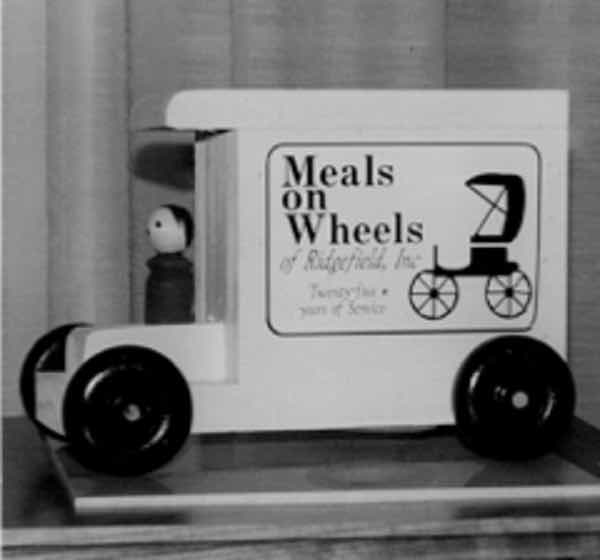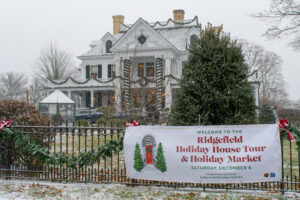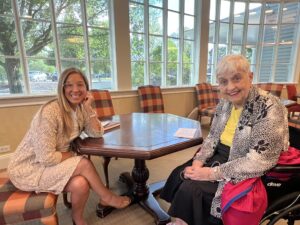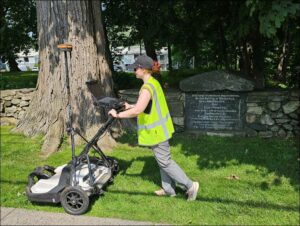According to Dean Miller, Meals on Wheels board chair, the organization began in 1974 when the Ridgefield Clergy Association “identified a need in the community to care for residents who were unable to prepare their own meals due to age, illness, injury and other disabilities”. Meals on Wheels of Ridgefield (MOW) was incorporated as a 501(c)(3) nonprofit and began operations on October 7, 1974. “Our founders, Barbara Deegan, Marian Sloan and Annette Zelson, started out cooking in the basement of Saint Mary School and initially delivered about 24 meals a week. During the first year of operation, we served approximately 5,300 meals.”
In a Ridgefield Press feature story in June 1974, Linette Burton (writing in character as “the little old lady” — L.O.L. for short) described an encounter with Cathy Carroll Petroni: “Shopping for her supper, she met Mrs. Romeo Petroni at the meat counter and, still uneasy about her uncertain future, she asked her what people did when they couldn’t cope with cooking.”
“‘Amazing you should ask me,’ Cathy Petroni responded. ‘A group is right now in the process of starting a Meals on Wheels program here which should be in operation by the fall.’”
Pointed to Barbara Deegan, who was the first cook for Meals on Wheels, the L.O.L. learned more:
“We want to reach people who need us. Age is no criteria. We want to help people widowed or living alone, people who have no desire to cook and are in the tea-and-toast syndrome. We want to help people keep their independence, stay in their own homes, not have to go to a nursing home to get proper nutrition,” said Mrs. Deegan.
What Set Ridgefield MOW Apart
In a history prepared for the 50th anniversary. Mr. Miller wrote: “From the very beginning, we prepared delicious and nutritious meals using fresh ingredients, whereas most other Meals on Wheels organizations contracted with a nursing home or hospital kitchen to source meals.
“Another key difference from other Meals on Wheels organizations at the time was instead of receiving federal or state funding, a small fee was charged to clients and all other funding came from the community: donations from individuals, businesses and civic organizations, as well as grants from foundations and trusts. In 1974, we were only one of two Meals on Wheels organizations in Connecticut that were not funded by the government. To this day, this independence allows us to tailor our program to the needs of the community without any age limits, income limits, quotas or waiting lists that come with government funding.”
A History of Growth
“Over the next few years,” wrote Mr. Miller “demand for our service grew and soon we needed new space for our kitchen. In 1983 we moved to what was the Ridgefield Family Y at Barlow Mountain Elementary School, and then in 1984 we moved into our current location at Ballard Green. We were serving a little under 10,000 meals a year at that time.
“As our services reached more clients in need, we expanded our Ballard Green space in 2003 when we were serving around 18,000 meals per year. During the first expansion in 2003, we contracted with Parma Deli to source the meals we delivered to clients until we completed construction and moved back into our larger space.”
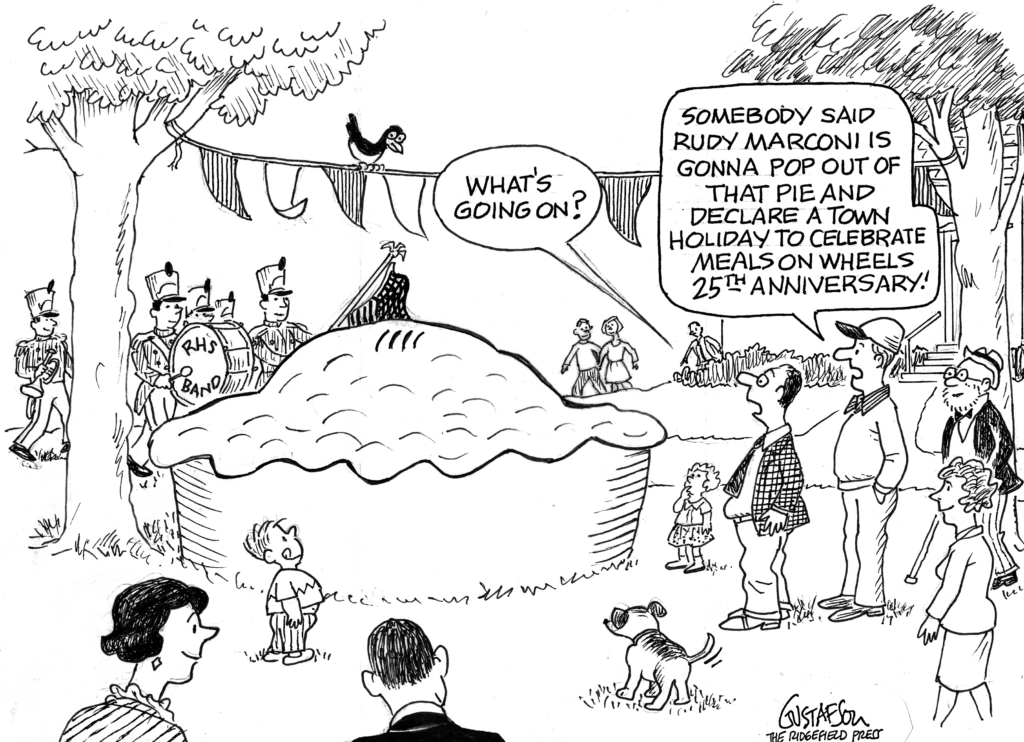
CARTOON: from Bob’s Ridgefield, a collection of Ridgefield Press cartoons by Bob Gustafson.
The clients who received food from Meals on Wheels in these years were appreciative of both the menus and the volunteer drivers who came to their homes to deliver the hot and cold dishes. In 1980, Linette Burton, again writing for The Ridgefield Press, began a story about the program with this:
“I don’t know what I would have done without them,” said Mrs. Anna Ferguson, her voice filled with emotion. “They’re so nice and sweet. They’re out of this world. The food is so good; I get enough for a week and we have grand times together.”
On another occasion, Ms. Burton went out with a MOW driver to do a feature story about that aspect of the program, which was recruiting volunteers. She wrote:
“What a glorious feeling to have someone hug you when you arrive at the front door and say with a lilt in her voice, ‘It’s like Christmas morning when I open the boxes and don’t know what’s inside. I haven’t gotten over the excitement when I open the packages.’”
Over the decades, MOW Ridgefield has stood out in Connecticut as one of only two MOW operations that prepares its own meals. Ethel Paquin, who wrote the Food & Drink column for The Ridgefield Press, talked with the chefs in the early years: “‘Most groups obtain the meals they deliver from hospital kitchens,’ Bobbi Meyer told me (Bobbi was the chief cook today, in charge of the main meal), ‘and you know that you can’t compare hospital food to good home cooking.’”
The menu that day was “Egg-drop Spinach Soup, Chicken Kiev, Twice-Baked Potato, Vegetables in Lemon Sauce, Rolls, Applecake; Cole Slaw, Tuna Salad Sandwich, Fruit, Milk.”
COVID and Another Expansion
“In 2017,” Mr. Miller wrote, “we began a concerted effort to spread the word about MOW, through community outreach efforts, a town-wide newsletter mailing, social media and the press. We experienced annual growth of over 20% and soon started planning for another expansion. When stay-at-home restrictions were put in place in the beginning of the COVID pandemic in early 2020, MOW reached out to let the community know we were available to help those who couldn’t get out to shop and cook for themselves.
“We then experienced even further growth and neared capacity at the same time we had to reduce the number of people in the kitchen in order to maintain social distancing. This was a significant challenge and we had to find creative ways to produce more meals with fewer people in our small kitchen. One of those was to arrange with Wooster Hollow Café and Dmitri’s Diner to procure entrees and sandwiches to supplement what we were making ourselves. Both of these restaurants were helpful and generous, offering us discounted prices and donating some of the meals. We were very grateful!
“After some delays in the approval process due to COVID, we started the expansion of our kitchen in the fall of 2020 during the midst of the COVID pandemic. Luckily, we were able to make arrangements to temporarily move our operation to a small kitchen at First Congregational Church, who were not holding indoor services during the pandemic. This move required a significant amount of planning to seamlessly provide meals to our clients, as well as some creativity in allowing us to work in a much smaller space. We were extremely grateful to the First Congregational Church, who told us that being able to help MOW was one of the only good things that came out of COVID for them! When the expansion was completed in December 2020, we moved back into our kitchen and were serving around 40,000 meals per year.”
Fees Eliminated in 2021
“From the time we were founded,” Mr. Miller wrote, “we had only charged a nominal fee that covered around 30% of our costs (and would waive the fee for those who couldn’t afford it). After receiving a large bequest, a very generous donation from a local family foundation, and with a large spike in donations during COVID, we made the decision to stop charging client fees starting in May 2021. This change was a big benefit to our clients, many of whom are on a fixed income.
We continue to be funded entirely by donations and couldn’t operate without the generosity of the community!”
MOW Today
“2024 is our 50thth anniversary and we now serve over 53,000 meals to over 220 clients each year. In addition to delicious and healthy meals, we provide many other special touches including gifts donated by the community and bags decorated by schoolchildren. Our volunteers provide a check-in, a connection to the community, and some friendly conversation when they deliver.
“We operate with only five part-time employees (no change since 2005!) and over 175 volunteers who continue to operate with the same dedication and care as our founders did 50 years ago. Our mission is to provide nourishment to those in Ridgefield who can’t prepare their own meals, and we are proud to be part of a network of organizations that help Ridgefield residents remain living in their home independently, where they want to be.
We plan to continue our mission for many years to come!”
The Ridgefield Historical Society looks forward to adding more MOW Ridgefield history to our collection for many years to come!
View the Meals on Wheels exhibit, curated by the Ridgefield Historical Society, at Ridgefield Town Hall Mon-Fri, 8:30am-4:30pm, through August 15.

